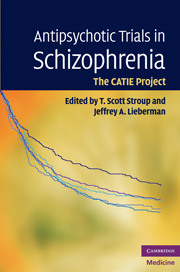Book contents
- Antipsychotic Trials in Schizophrenia
- Antipsychotic Trials in Schizophrenia
- Copyright page
- Dedication
- Contents
- Contributors
- Acknowledgments
- Introduction
- Chapter 1 Study design and protocol development process
- Chapter 2 Statistical considerations
- Chapter 3 Effectiveness and efficacy: staying on treatment and symptom reduction
- Chapter 4 Cost-effectiveness and cost-benefit analysis
- Chapter 5 Psychosocial functioning in patients with chronic schizophrenia: findings from the NIMH CATIE study
- Chapter 6 Neurocognition
- Chapter 7 Vocational outcomes
- Chapter 8 Family outcomes
- Chapter 9 Extrapyramidal side effects
- Chapter 10 Metabolic side effects and risk of cardiovascular disease
- Chapter 11 Substance use in persons with schizophrenia: incidence, baseline correlates, and effects on outcome
- Chapter 12 Violence in schizophrenia: prevalence, correlates, and treatment effectiveness
- Chapter 13 Genetic investigations in the CATIE sample
- Chapter 14 Human subjects considerations
- Chapter 15 Population pharmacokinetics of antipsychotics
- Chapter 16 Implications for research design and study implementation
- Chapter 17 Conclusion and implications for practice and policy
- Index
Chapter 7 - Vocational outcomes
Published online by Cambridge University Press: 03 May 2010
- Antipsychotic Trials in Schizophrenia
- Antipsychotic Trials in Schizophrenia
- Copyright page
- Dedication
- Contents
- Contributors
- Acknowledgments
- Introduction
- Chapter 1 Study design and protocol development process
- Chapter 2 Statistical considerations
- Chapter 3 Effectiveness and efficacy: staying on treatment and symptom reduction
- Chapter 4 Cost-effectiveness and cost-benefit analysis
- Chapter 5 Psychosocial functioning in patients with chronic schizophrenia: findings from the NIMH CATIE study
- Chapter 6 Neurocognition
- Chapter 7 Vocational outcomes
- Chapter 8 Family outcomes
- Chapter 9 Extrapyramidal side effects
- Chapter 10 Metabolic side effects and risk of cardiovascular disease
- Chapter 11 Substance use in persons with schizophrenia: incidence, baseline correlates, and effects on outcome
- Chapter 12 Violence in schizophrenia: prevalence, correlates, and treatment effectiveness
- Chapter 13 Genetic investigations in the CATIE sample
- Chapter 14 Human subjects considerations
- Chapter 15 Population pharmacokinetics of antipsychotics
- Chapter 16 Implications for research design and study implementation
- Chapter 17 Conclusion and implications for practice and policy
- Index
Summary
- Type
- Chapter
- Information
- Antipsychotic Trials in SchizophreniaThe CATIE Project, pp. 120 - 132Publisher: Cambridge University PressPrint publication year: 2010

